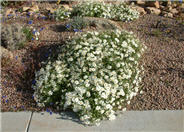
Common name:Blackfoot Daisy
Botanical name:Melampodium leucanthum
Small mounding perennial grows quickly to 1' x 2'. White daisylike flowers with yellow centers cover the plant nearly year-round The leaves are narrow and gray-green. Accepts full sun or partial shade but blooms better in the sun. Bright and colorful groundcover. Plant in well-drained soil. Native to the southwest U.S. and Mexico.
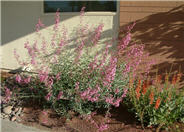
Common name:Parry's Penstemon
Botanical name:Penstemon parryi
This perennial grows at a moderate rate to 1-1/2' x 1-1/2'. Blue-green leaves form a rosette at the base of the plant. Hot pink flowers appear on spike in the spring. Reseeds easily. Accepts full sun or partial shade. Plant in fall for spring flowers. Attracts hummingbirds. Tender perennial at higher elevations. Native to southern Arizona and Sonora.
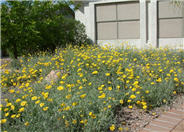
Common name:Desert Marigold
Botanical name:Baileya multiradiata
Fast growing perennial reaches 1' x 1'. Soft silvery gray leaves. Bright yellow daisy like flowers appear year round. This undemanding plant reseeds easily. Accepts reflected sun. Be careful not to overwater. Native to southwest U.S. and northern Mexico.
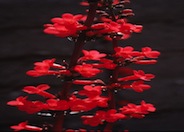
Common name:Coral Penstemon
Botanical name:Penstemon superbus
This perennial grows at a moderate rate to 2' x 3'. Leaves are blue-green and vivid coral flowers appear in late spring. Reseeds easily. Plant in fall for spring flowers. Accepts full sun or partial shade. Attracts hummingbirds. Native to the Chihuahuan Desert.
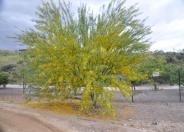
Common name:Desert Museum Palo Verde
Botanical name:Parkinsonia 'Desert Museum'
Striking, generally multi-trunked tree to 25' tall and wide. Three-way cross between P. aculeata, P. microphyllum, and P. floridum. Plants are thornless, and produce abundant clusters of yellow flowers in the spring.
Designer: Carol Stuttard, Homeowner
Photographer: GardenSoft
Incorporate compost 6" into your soil to retain water, reduce compaction, feed earthworms, and provide valuable nutrients to your plants.
Check the soil's moisture level before watering.
You can reduce your water use 20-50% by regularly checking the soil before watering.
Remove irrigation water and fertilizer from areas where you don't want weeds to grow.